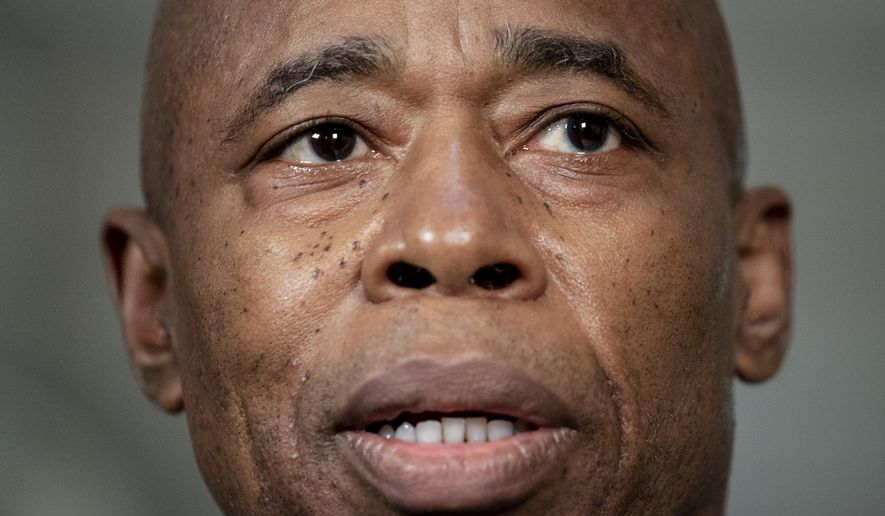OPINION:
“It’s unimaginable that we keep pretending that this is not a country of faith.”
New York Mayor Eric Adams was clearly flummoxed last Monday when he made this proclamation about faith in America — a perplexed and unwavering reaction to persistent questions he has faced surrounding his beliefs about the separation of church and state.
The Democratic mayor is finding friends and foes in the most unlikely places after he recently delivered a rip-roaring rebuke of society’s removal of prayer and faith from schools and society.
But Mr. Adams’ statement deriding the continued pearl-clutching over America’s obvious religious culture and tradition is particularly fascinating, especially after his initial comments landed him in atheist activists’ crosshairs and at the center of national headlines.
“Don’t tell me about no separation of church and state,” Mr. Adams said at an interfaith prayer event earlier this month, immediately igniting headlines. “State is the body. Church is the heart. You take the heart out of the body, the body dies.”
“The body dies.” I can’t think of a better way to describe our ever-decaying culture. But he wasn’t done there.
The mayor also spoke about his inability as an elected official to separate his religious beliefs from his service, explaining how his faith impacts his governance.
“When I walk, I walk with God. When I talk, I talk with God,” Mr. Adams said. “When I put policies in place, I put them in with a God-like approach to them.
“I am still a child of God and will always be a child of God, and I won’t apologize about being a child of God. It is not going to happen.”
Those comments led the Freedom From Religion Foundation, an atheist activist group, to call Mr. Adams’ comments “disgraceful” and demand a retraction.
But the politician, who warned us he wouldn’t apologize, has seemingly thumbed his nose at the suggestion, doing just the opposite. He appeared this week on CNN and NY1 to clarify his remarks, adding fuel to atheists’ flames of consternation.
Meanwhile, Mr. Adams continues to raise the eyebrows of social conservatives and the faithful — people from whom praise for the Democrat might not typically flow.
Let’s look at one more proclamation he made at the interfaith prayer speech — one of the most pertinent to the debate: “When we took prayers out of schools, guns came into schools.”
Mr. Adams has expounded on what he meant. He told NY1 that his guns and schools comment is “symbolism of what we’re doing to our children,” citing the many issues facing young people today. From drugs to image issues, he painted a dire picture and said the reluctance to discuss faith is damaging youths.
“We have everything in schools that we’re talking about, but we don’t want to talk about the faith of our children, that holistic approach,” Mr. Adams said. “I’m not trying to be popular. I’m trying to do what’s right. Our children are in pain, and, as adults, we have a responsibility, and, as a mayor, I have an obligation to make sure I address it.”
Despite my disagreements with Mr. Adams on a slew of issues, his refusal to bow to the mob and his recognition of the essential nature of faith must be commended.
Our culture has continued to remove God, truth and fixed moral standings from our schools, institutions and society at large — and the results have been dire.
The “god of the self” is a damaging, self-serving mentality that is obliterating our institutions and the nation’s moral fabric at large. And yet culture continues to march down that road like lemmings off a cliff, ignoring every sign and warning post along the way.
Mr. Adams is right to note the horrific impact our godless culture is having on our children. Furthermore, his discussion about his own inability to separate his personal faith from policymaking is a long-overdue admission that simply states a commonsense reality.
When we elect a politician, we’re choosing every part of that individual. If faith holds a primary role in a candidate’s life, one shouldn’t be surprised to see that person live out his or her beliefs in policymaking. That’s not a theocratic dynamic — and it’s certainly not one that violates any sort of constitutional value.
Just as an atheist governs through a godless paradigm, a believer does so through his or her religious lens. If voters like or dislike such dynamics, they can reject candidates at the polls.
Mr. Adams might be wrong about some things, but he’s certainly spot on with his statement that it’s “unimaginable” that we keep pretending America doesn’t have a robust relationship with faith. Our ongoing denial, if left unfettered, will be the death of us.
• Billy Hallowell is a digital TV host and interviewer for Faithwire and CBN News and the co-host of CBN’s “Quick Start Podcast.” Hallowell is the author of four books, including “Playing With Fire: A Modern Investigation Into Demons, Exorcism, and Ghosts,” and “The Armageddon Code: One Journalist’s Quest for End-Times Answers.”




Please read our comment policy before commenting.